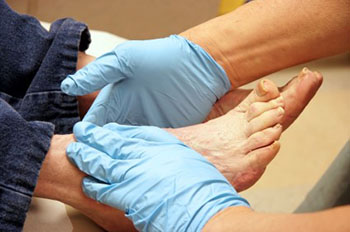Connect With Us
Diabetic Foot

Unfortunately, foot problems are often a common result of having diabetes. As time goes by, it’s likely that diabetes can cause nerve damage, also known as diabetic neuropathy. This can lead to tingling or a painful sensation, and it may also cause you to lose feeling in your feet. The loss of feeling in your feet can become incredibly dangerous, especially if you can longer sense a blister or cut on your foot; this can lead to sores or infections.
There are many ways to maintain healthy foot care when dealing with diabetes. Most importantly, you want to ensure that you’re managing your blood glucose levels, otherwise known as your blood sugar. You also want to ensure that you’re checking your feet daily. As mentioned before, it’s important to recognize if your feet have cuts, sores, blisters, plantar warts, ingrown toenails, or other troubling foot conditions to stay ahead of the issue and prevent yourself from further harm. Along with foot checks, you should also wash and dry your feet daily using lukewarm water. It may also be useful in certain cases to moisturize your feet a few times a week, especially if you’re prone to dryness. Please be advised, however, to avoid moisturizing between the toes as they will not dry properly. Another rule you may want to follow is to ensure you’re cutting your toenails straight across. You should also refrain from digging into the sides of the toes; this will help prevent the development of an ingrown toenail. If you do happen to develop a corn or callus, never treat them yourself; seek the help of a professional. It may also be beneficial to look into socks made specifically for those with diabetes to help provide yourself with extra cushion. You may also want to refrain from walking barefoot, as well as avoid smoking, as it restricts the blood flow to your feet.
In certain serious cases, you may notice a cut, blister, or bruise is not healing after a few days. If this occurs, it’s important to seek the help of a professional. Other warning signs include redness, swelling, a callus with dried blood inside of it, or an infection that causes discoloration of the foot and an odor.
People living with diabetes are much more likely to suffer from decreased circulation, nerve damage, and infections in their extremities, including their feet. Poor management of diabetes and the conditions associated with it can allow a small wound or a blister to become infected, potentially growing into a serious condition requiring amputation. Nerve damage can cause dehydration of the skin to the point that it cracks open which creates another pathway for fungi and bacteria to enter into the body. The All Care Foot Center of Palmdale, CA can provide the proper diabetic foot care to prevent the infections and other complications that can arise in diabetic patients as well as effective treatment if they do.
Preventive Diabetic Foot Care
To prevent the complications that often develop in people with diabetes, it’s important to take a proactive approach to foot care. That includes adhering to a healthy diet as prescribed by your physician, following an exercise regimen, and having regular checkups with your doctor. Diabetic patients should especially pay attention to their feet, inspecting them daily and following a proper diabetic foot care routine, including the following:
- Inspecting the feet, including the soles and toes, for puncture wounds, redness, blisters, bruises, cuts, scratches, and ulcers
- Washing feet daily with warm water and soap
- Regular toenail trimming
- Applying lotion for soft skin
- Removing calluses and corns
Wearing comfortable shoes that fit well is essential to diabetic foot care. Ill-fitting shoes can lead to calluses, blisters, corns, and hammertoe. Shoes designed for walking and sports are recommended for their foot support and ability to breathe. Diabetic patients should avoid shoes that have high heels or pointed toes or are made with plastic or vinyl.
The proper socks should be considered also. Socks should always be worn when wearing shoes, and they should be clean, dry, and thick enough to provide some padding to help prevent the development of blisters and open sores. Walking barefoot should be avoided by diabetics at all times because bacterial and fungal infections can be introduced to the feet and existing ones can be easily transmitted to others.
Effective Management Is Essential
Diabetes can be controlled with proper management, and a critical part of that is taking the proper precautions with the feet to avoid infections. Untreated or improperly treated infections in diabetic patients can lead to gangrene developing, with the only treatment at that point being surgery to remove dead tissue, up to and including amputation of the affected foot.
Effective diabetic foot care can help to prevent the serious complications that patients can suffer from, and All Care Foot Center of Palmdale, CA is experienced at providing it. For more information about our services or to schedule an appointment, call our offices at 661-273-3338 or contact us online anytime.
If you’d like more information on how to maintain healthy feet while living with diabetes, seek the assistance of a podiatrist who can provide you with the tips needed for healthy foot care.
